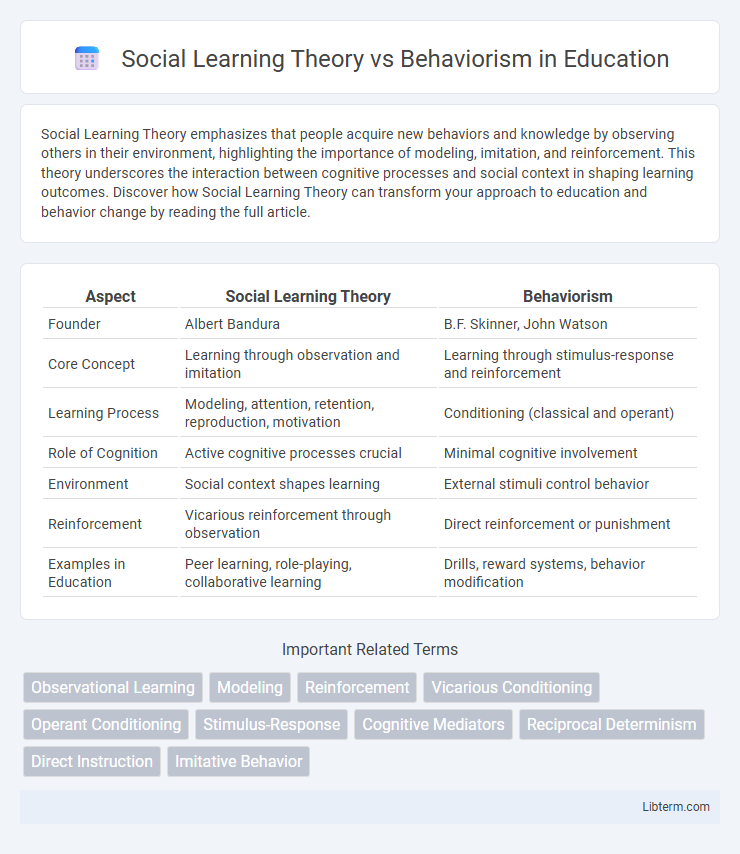Social Learning Theory emphasizes that people acquire new behaviors and knowledge by observing others in their environment, highlighting the importance of modeling, imitation, and reinforcement. This theory underscores the interaction between cognitive processes and social context in shaping learning outcomes. Discover how Social Learning Theory can transform your approach to education and behavior change by reading the full article.
Table of Comparison
| Aspect | Social Learning Theory | Behaviorism |
|---|---|---|
| Founder | Albert Bandura | B.F. Skinner, John Watson |
| Core Concept | Learning through observation and imitation | Learning through stimulus-response and reinforcement |
| Learning Process | Modeling, attention, retention, reproduction, motivation | Conditioning (classical and operant) |
| Role of Cognition | Active cognitive processes crucial | Minimal cognitive involvement |
| Environment | Social context shapes learning | External stimuli control behavior |
| Reinforcement | Vicarious reinforcement through observation | Direct reinforcement or punishment |
| Examples in Education | Peer learning, role-playing, collaborative learning | Drills, reward systems, behavior modification |
Introduction to Social Learning Theory and Behaviorism
Social Learning Theory, pioneered by Albert Bandura, emphasizes learning through observation, imitation, and modeling within social contexts, highlighting the role of cognitive processes and environmental influence. Behaviorism, founded by figures like John B. Watson and B.F. Skinner, focuses on observable behaviors shaped by reinforcement and punishment, prioritizing stimulus-response relationships without accounting for internal mental states. The contrast lies in Social Learning Theory's integration of cognitive functions and social factors, whereas Behaviorism strictly adheres to external behavior modification through conditioning.
Historical Background and Key Proponents
Social Learning Theory, pioneered by Albert Bandura in the 1960s, emerged as a response to the limitations of Behaviorism by emphasizing observational learning, imitation, and modeling in human behavior. Behaviorism, rooted in the early 20th century with key figures like John B. Watson and B.F. Skinner, focused on external stimuli and observable responses, promoting reinforcement and conditioning as the primary mechanisms of learning. Both theories significantly influenced educational psychology, with Behaviorism laying the groundwork for experimental rigor and Social Learning Theory expanding the understanding of cognitive and social factors in learning.
Core Principles of Social Learning Theory
Social Learning Theory emphasizes observational learning, imitation, and modeling as core principles, highlighting that individuals acquire new behaviors by watching others and the consequences of those behaviors. It integrates cognitive processes such as attention, retention, reproduction, and motivation, distinguishing it from Behaviorism, which focuses primarily on stimulus-response conditioning and reinforcement. Bandura's concept of reciprocal determinism underscores the dynamic interaction between personal factors, behavior, and environment in shaping learning outcomes.
Fundamental Concepts of Behaviorism
Behaviorism centers on observable behaviors shaped by environmental stimuli, emphasizing conditioning processes such as classical and operant conditioning. Key principles include reinforcement, punishment, and stimulus-response associations that drive behavior modification without considering internal mental states. In contrast, Social Learning Theory incorporates observational learning and cognitive factors, highlighting the role of modeling and imitation in acquiring new behaviors.
Differences in Learning Mechanisms
Social Learning Theory emphasizes learning through observation, imitation, and modeling, highlighting the role of cognitive processes and social context in acquiring new behaviors. Behaviorism focuses on direct stimulus-response associations and reinforcement or punishment, where learning is a result of conditioning without involving internal mental states. The key difference lies in Social Learning Theory's incorporation of cognition and social interaction as essential mechanisms, whereas Behaviorism relies solely on external observable behaviors and environmental stimuli.
Role of Reinforcement and Punishment
Social Learning Theory emphasizes observational learning where reinforcement and punishment influence behavior indirectly through modeled consequences, highlighting the importance of cognitive processes in interpreting these outcomes. Behaviorism relies on direct reinforcement and punishment to shape behavior, focusing on stimulus-response relationships without considering internal mental states. The distinction lies in Social Learning Theory's integration of vicarious reinforcement and punishment, whereas Behaviorism strictly applies these mechanisms through direct experience.
Importance of Observation and Modeling
Social Learning Theory emphasizes the critical role of observation and modeling in acquiring new behaviors, suggesting individuals learn by watching others and imitating their actions. Behaviorism focuses primarily on direct reinforcement and punishment to shape behavior but underestimates the power of observational learning. Bandura's research highlights that modeling not only facilitates skill acquisition but also influences motivation and emotional responses in social contexts.
Applications in Education and Classroom Settings
Social Learning Theory emphasizes observational learning, modeling, and imitation, enabling educators to incorporate role models and peer interaction to enhance student engagement and social skills. Behaviorism relies on reinforcement and punishment to shape student behavior, making it effective for establishing routines, managing classroom behavior, and promoting desired responses through consistent feedback. Integrating both theories allows for a balanced approach where cognitive processes and external behaviors are addressed, optimizing instructional strategies and classroom management for diverse learning needs.
Criticisms and Limitations of Each Theory
Social Learning Theory faces criticism for its reliance on observational learning, which may underestimate the influence of biological factors and internal cognitive processes on behavior. Behaviorism is limited by its emphasis on observable behaviors, often neglecting mental states and emotions crucial to understanding complex human actions. Both theories struggle to fully explain behavior in diverse contexts due to their reductionist approaches and insufficient attention to individual differences.
Conclusion: Choosing the Right Approach
Selecting the appropriate approach depends on educational goals and learner needs; Social Learning Theory emphasizes observational learning and cognitive processes, fostering motivation and social interaction, while Behaviorism focuses on measurable behavior changes through reinforcement and conditioning. Integrating Social Learning principles often enhances engagement and retention in collaborative settings, whereas Behaviorism offers clear frameworks for skill acquisition and behavior modification. Educators should consider combining both theories to create balanced, effective learning environments tailored to specific contexts.
Social Learning Theory Infographic

 libterm.com
libterm.com